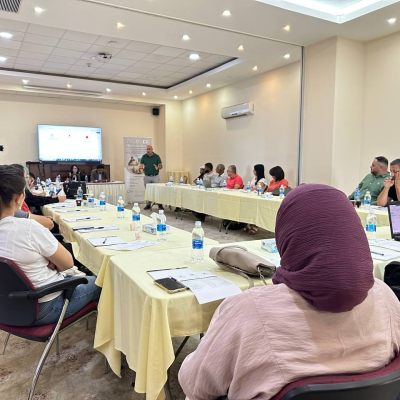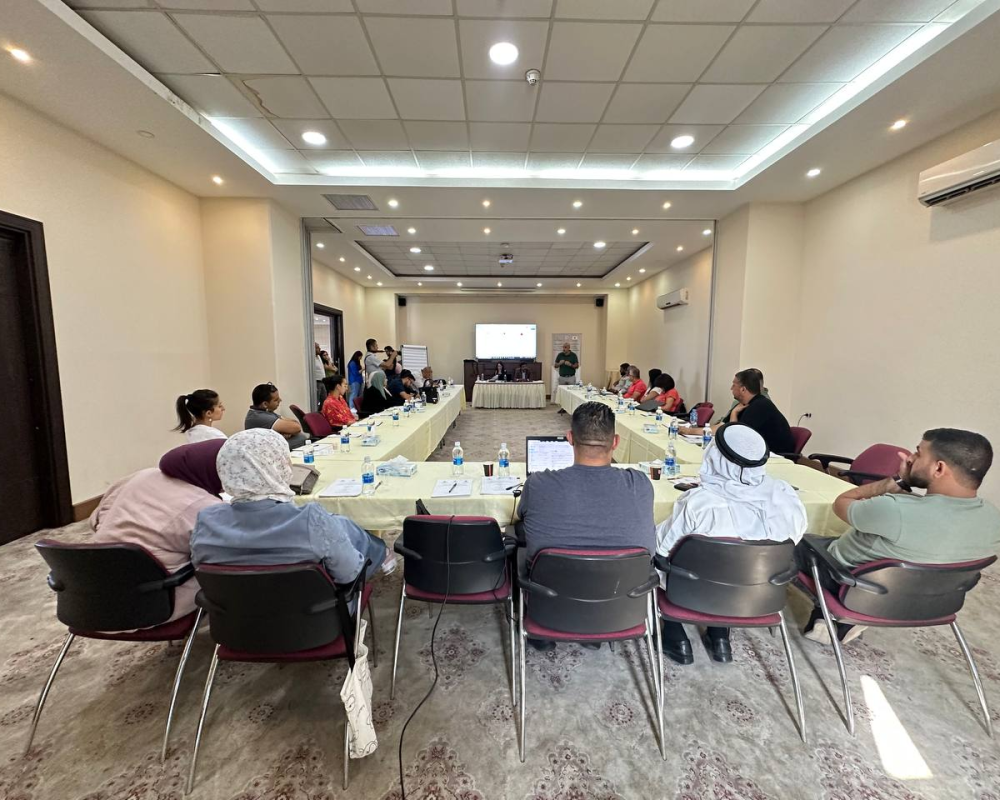
Ramallah/PNN - The Palestinian Heritage Trail launched a project aimed at increasing economic opportunities and improving livelihoods for local communities along the Palestinian Heritage Trail in the West Bank. The project is funded by the Japan Social Development Fund through the World Bank.
The launching activities of the project included training sessions on the implementation mechanisms of the approved initiatives, totaling fifteen initiatives aimed at developing and promoting community-based tourism services along the Palestinian Heritage Trail. The activities concluded with the signing of support agreements for the winning initiatives.
During the meeting, several workshops were conducted throughout the day. Raed Rajab discussed the financial procedures for grant disbursement and the importance of complying with the procedures set by the World Bank. Nabala Bannoura from the Palestinian Heritage Trail discussed the necessary procedures for project implementation. Heba Al-Hawash spoke about the bidding system, while Issa Al-Rabdi discussed monitoring, evaluation, and reporting systems. Nadine Sahhouri, responsible for the environmental and social framework, also shared her insights.
Representatives from the Ministry of Tourism, including Osama Esteti, the Director General of Tourism Services at the Ministry of Tourism and Antiquities, Raed Rajab from the World Bank, and George Rishmawi, the Director of the Palestinian Heritage Trail, welcomed all attendees, including service providers along the Palestinian Heritage Trail.
Rishmawi expressed his satisfaction with reaching this day and starting the project by taking a practical step. He mentioned that work on the project began three years ago with the support of the Palestinian Ministry of Tourism in collaboration with the Palestinian Heritage Trail, focusing on development.
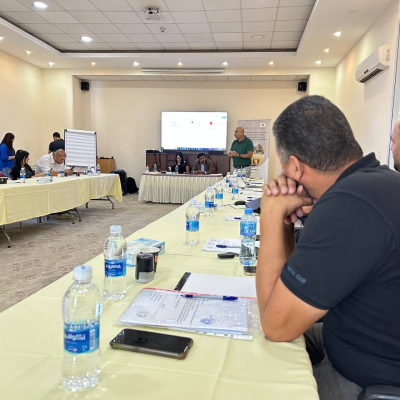
Rishmawi stated that the Palestinian Heritage Trail had been working with the World Bank for four years, leading up to the implementation phase. He emphasized the importance of partnerships with local institutions such as the Tourism Ministry, Bethlehem University, and the Environmental Quality Authority.
He further explained that the comprehensive project serves both the community and the tourism sector, incorporating the environmental and social frameworks to enhance community-based tourism. He praised the cooperation of international donors, particularly the Japan Social Development Fund through the World Bank.
Rishmawi expressed hope for future investments by Palestinians to sustain Palestinian tourism and heritage, rather than relying solely on international funding. He expressed hope that the private sector would show greater interest in community-based tourism.
The Director of the Palestinian Heritage Trail emphasized that this day marks the beginning of a series of broader projects, reaching up to forty projects, and potentially increasing to seventy, depending on the successes achieved.
He stressed the importance of the initial grant recipients, who will be relied upon to implement the projects, and highlighted the significance of maintaining service quality and executing projects at the highest standards.
Esteti stated that the Ministry considers this project vital, as it aligns with the integrated efforts to promote various forms of tourism. He emphasized that the Ministry of Tourism and Antiquities aims to develop Palestinian tourism and explore opportunities for promoting Palestine in various tourism sectors beyond religious tourism, which has seen significant achievements.
Esteti added that the Ministry is working to activate other tourism programs and patterns, including eco-tourism, desert tourism, religious tourism, and community-based tourism. These efforts are part of the Ministry's policies and programs to develop tourism by focusing on the cultural heritage of Palestine, including its social components. Palestine is rich in heritage, narratives, and traditional crafts.
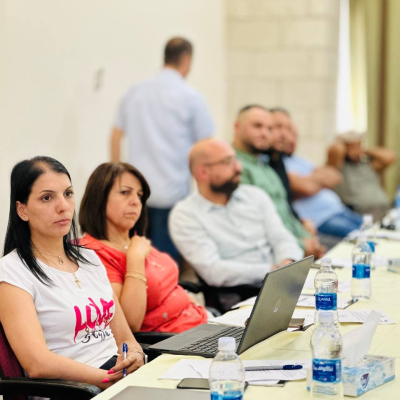
Esteti thanked the Palestinian Heritage Trail and the World Bank, expressing the readiness of the Ministry of Tourism to cooperate and support the efforts of active institutions. He expressed hope that the beneficiaries would take the project seriously and viewed any successful experience as a foundation for real tourism development from the Ministry's perspective.
Rahel, the Project Manager, welcomed the attendees who came from various areas along the Palestinian Heritage Trail to participate in this day and the project, which includes the signing of fifteen cooperation agreements with fifteen service providers along the trail. She mentioned that these agreements are funded by the Japan Social Development Fund through the World Bank.
Rahel also welcomed the participation of institutions working in the tourism field at different levels, which will benefit from this project, including guesthouses, restaurant service providers, event organizers, media promotion, environmental and nature trails, horseback riding, and other community-based tourism activities that reflect Palestinian reality and life.
She pointed out that this project operates under the supervision of the Palestinian Ministry of Tourism and Antiquities, which plays an important and fundamental role in the project. The ministry has collaborated with other partners to evaluate the provided grants. Today, fifteen grants were approved out of the 266 submitted initiatives. Rahel thanked the Steering Committee, consisting of the Ministry of Tourism, Bethlehem University, the management of the trail, and a number of experts and specialists. The approved initiatives were fortunate to be the first to receive funding for expanding and developing tourism services.
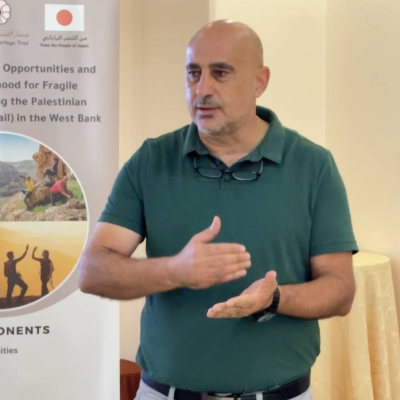
The day's events, which conclude with workshops, aim to ensure successful management of the grants, leading to community and national tourism development that serves the Palestinian people and the Palestinian cause through tourism.
Service providers express their gratitude for these grants:
Ibrahim Mubarak, the Executive Director of Al-Adib Arabian Horses Stable, stated that their initiative focuses on developing a stable for purebred Arabian horses and organizing horseback riding tours in the Jerusalem desert. This project will contribute to promoting the Palestinian presence in the Jerusalem and Bethlehem deserts. Mubarak expressed his thanks to the Palestinian Heritage Trail, the Japan Social Development Fund, and the World Bank for selecting their tourism initiative.
Ayat Mohammed Mardawi, the owner of a guesthouse in Arraba, Jenin, stated that this project is important and vital. It will help her develop and expand her guesthouse after witnessing an increase in local and international tourists along the trail in the northern West Bank. She emphasized that this grant will contribute to enhancing and renovating her guesthouse. Mardawi expressed her gratitude to the Palestinian Heritage Trail and everyone who supported her in this initiative, as her guesthouse serves as a platform to introduce tourists to Palestinian heritage, culture, traditions, and cuisine.
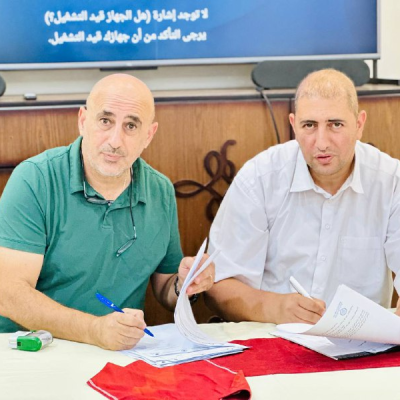
Munjad Jadou, the General Manager of Palestine News Network (PNN), stated that the network has a cooperative partnership with the Palestinian Heritage Trail. Over the years, they have produced various media materials, including reports, news articles, and promotional videos, to promote the trail. After the announcement of the project and grants, they proposed an initiative to produce and document media content that highlights the project's progress and promotes community-based tourism services. Jadou added that PNN's initiative also includes training service providers along the Palestinian Heritage Trail in content creation, video production, and digital promotion of their media services. He expressed his happiness and pride in the longstanding relationship with the Palestinian Heritage Trail, which has involved media and advertising partnerships over the years, focusing on media collaboration rather than commercial partnerships.
This project represents an additional qualitative leap in the development of Palestinian tourism. It will contribute to increasing economic opportunities and improving livelihoods for communities along the Palestinian Heritage Trail.
